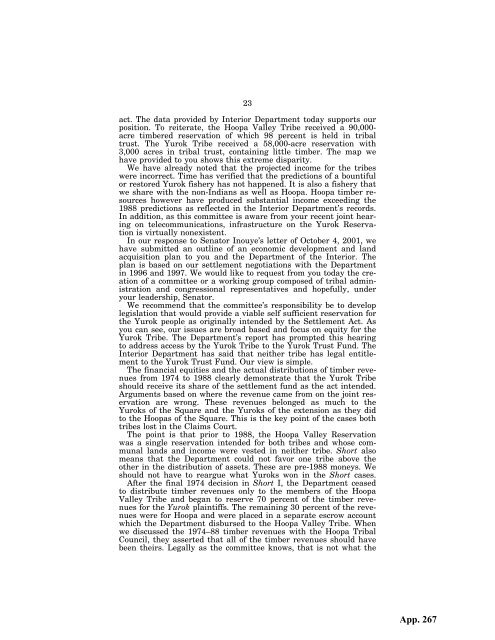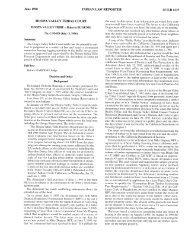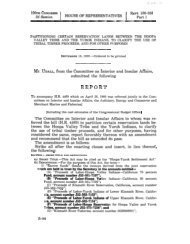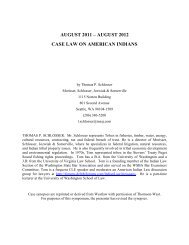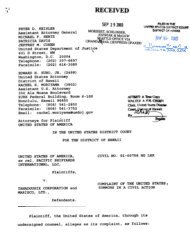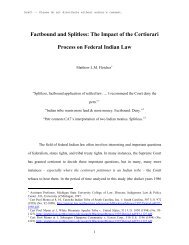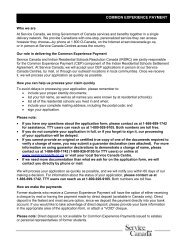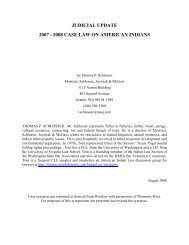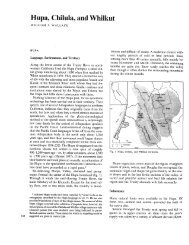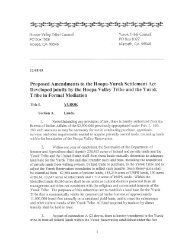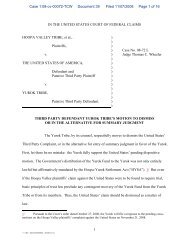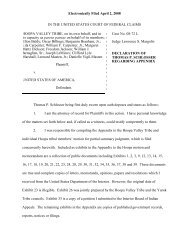Hoopa appendix supporting summary judgment - Schlosser Law Files
Hoopa appendix supporting summary judgment - Schlosser Law Files
Hoopa appendix supporting summary judgment - Schlosser Law Files
You also want an ePaper? Increase the reach of your titles
YUMPU automatically turns print PDFs into web optimized ePapers that Google loves.
23<br />
act. The data provided by Interior Department today supports our<br />
position. To reiterate, the <strong>Hoopa</strong> Valley Tribe received a 90,000-<br />
acre timbered reservation of which 98 percent is held in tribal<br />
trust. The Yurok Tribe received a 58,000-acre reservation with<br />
3,000 acres in tribal trust, containing little timber. The map we<br />
have provided to you shows this extreme disparity.<br />
We have already noted that the projected income for the tribes<br />
were incorrect. Time has verified that the predictions of a bountiful<br />
or restored Yurok fishery has not happened. It is also a fishery that<br />
we share with the non-Indians as well as <strong>Hoopa</strong>. <strong>Hoopa</strong> timber resources<br />
however have produced substantial income exceeding the<br />
1988 predictions as reflected in the Interior Department’s records.<br />
In addition, as this committee is aware from your recent joint hearing<br />
on telecommunications, infrastructure on the Yurok Reservation<br />
is virtually nonexistent.<br />
In our response to Senator Inouye’s letter of October 4, 2001, we<br />
have submitted an outline of an economic development and land<br />
acquisition plan to you and the Department of the Interior. The<br />
plan is based on our settlement negotiations with the Department<br />
in 1996 and 1997. We would like to request from you today the creation<br />
of a committee or a working group composed of tribal administration<br />
and congressional representatives and hopefully, under<br />
your leadership, Senator.<br />
We recommend that the committee’s responsibility be to develop<br />
legislation that would provide a viable self sufficient reservation for<br />
the Yurok people as originally intended by the Settlement Act. As<br />
you can see, our issues are broad based and focus on equity for the<br />
Yurok Tribe. The Department’s report has prompted this hearing<br />
to address access by the Yurok Tribe to the Yurok Trust Fund. The<br />
Interior Department has said that neither tribe has legal entitlement<br />
to the Yurok Trust Fund. Our view is simple.<br />
The financial equities and the actual distributions of timber revenues<br />
from 1974 to 1988 clearly demonstrate that the Yurok Tribe<br />
should receive its share of the settlement fund as the act intended.<br />
Arguments based on where the revenue came from on the joint reservation<br />
are wrong. These revenues belonged as much to the<br />
Yuroks of the Square and the Yuroks of the extension as they did<br />
to the <strong>Hoopa</strong>s of the Square. This is the key point of the cases both<br />
tribes lost in the Claims Court.<br />
The point is that prior to 1988, the <strong>Hoopa</strong> Valley Reservation<br />
was a single reservation intended for both tribes and whose communal<br />
lands and income were vested in neither tribe. Short also<br />
means that the Department could not favor one tribe above the<br />
other in the distribution of assets. These are pre-1988 moneys. We<br />
should not have to reargue what Yuroks won in the Short cases.<br />
After the final 1974 decision in Short I, the Department ceased<br />
to distribute timber revenues only to the members of the <strong>Hoopa</strong><br />
Valley Tribe and began to reserve 70 percent of the timber revenues<br />
for the Yurok plaintiffs. The remaining 30 percent of the revenues<br />
were for <strong>Hoopa</strong> and were placed in a separate escrow account<br />
which the Department disbursed to the <strong>Hoopa</strong> Valley Tribe. When<br />
we discussed the 1974–88 timber revenues with the <strong>Hoopa</strong> Tribal<br />
Council, they asserted that all of the timber revenues should have<br />
been theirs. Legally as the committee knows, that is not what the


